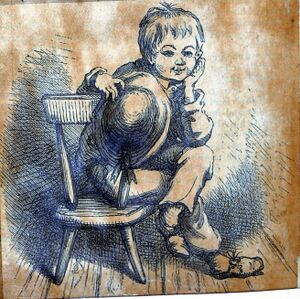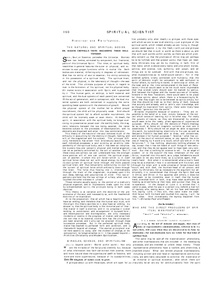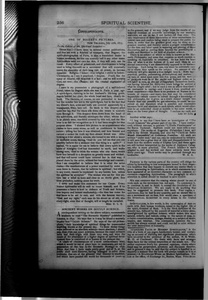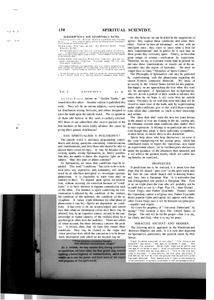Miracles, Science, and Spiritualism
World beyond world I World within world! Not only are the miracles of the Scriptures credible, but because of what information now faith can extract from science, more and more natural does the supernatural seem to become, and more and more supernatural, because of its susceptibilities, does the kingdom of nature seem to grow.
A glimpse about us with those eyes, which will open for us first probably only after death,—a glimpse with those eyes with which we are to see to all eternity,—just a glimpse of the spiritual world, which indeed already we are living in, though we are cased against it by the flesh,—with just one glimpse we should feel that in such a world as there is about us, and that with such worlds within worlds, as there are which probably concern us, that the promises of Christ may yet perhaps be to be fulfilled, and that greater works than have yet been done, Christians may yet do by invoking, in faith, Him of that name which is above every name, and unto whom morals, politics, and science, rule, authority, and power, and all things, are to be subdued. And with that one glimpse, too, what impossibilities as to belief would vanish! For in that widened sphere, vitally connected with humanity, that the spirit of demons might be competent to add confusion to human affairs, by working miracles in some way or other, on the road, and at the time contemplated in the book of Revelation,—this all would seem to be not much more improbable than that wicked rulers should ever be backed by genius. And between the highest and the lowest sources of miracles, foretold in the New Testament, there would seem to be place for those spirits, about whom there is a forewarning by St. John, that they ought not to be believed as spirits simply, but that they should be tried as to their being of God, because that actually and already, and to John’s own knowledge, and as though by inspiration from spirits, there were many false prophets “gone out into the world.”
Miracles impossible because of science! They are impossible to the belief of a man, simply because of the conceit which comes of learning, but in no other way. For really the powers of nature, as they are discovered by science, would seem to be the ready, pliant agencies of supernatural purposes. Why should not the demons of Plato’s theology be as much at home on magnetic currents as men are in steamboats? Why should not an angel be able to approach this earth, by subordinating electricity to his use, as well as Benjamin Franklin has been able to draw, and concentrate, and enslave it for human purposes? Science! what has science, in the court of common sense, to say against the miracles of healing, by a word or a touch, which are told of in the Scriptures? It has nothing, absolutely nothing whatever to say, except that it has not heard of such things of late centuries, and that they do not appear ever to have been very common. But that is nothing for science to tell. To an angel of wisdom, or to the eyes of the best inhabitant of the star Sirius, imported into this earth, as a judge, belladonna would not seem to be any more likely, as a curative agent, than a roan’s hand. And when it is remembered what a man’s hand may be as a channel,—how it is connected with his brain, and through his brain with a wide universe of forces known and occult, and with God, the fountain-head of all power; and when, by Christians, not as necessary to the argument but additionally, it is remembered that through the Spirit God was in Christ, and Christ in his apostles and others, it does not then seem to be incredible, even in itself, that the human hand, stretched forth in faith, may have been as efficient for healing as dried herbs at their best, and quicker than they as to operation. I n the Gospel of Luke it is written that “it came to pass, when he was in a certain city, behold a man full of leprosy, who, seeing Jesus, fell on his face and besought him, saying. Lord, if thou wilt, thou canst make me clean. And he put forth his hand and touched him, saying, I will: be thou clean. And immediately the leprosy departed from him.”—Miracles Past and Present.
Ancient Works on Occult Science
A correspondent writing on the above subject, recommends students to read “The Hermetic Mystery” published in London, in 1850. He says that in it may be found a masterly inquiry into “Occult Science.” He says of the old philosophers,” their knowledge of spiritual things far transcended anything known at the present day. To them divine things were reduced to an absolute science—more absolute, I should say, than even our exact sciences, because the exact sciences have had their origin with these very men, and were the result of the attainment of a higher degree of spiritual development than is conceived of or known at the present day.
A chain of circumstances of a most extraordinary kind, which it would be out of place here to enumerate, put me in possession of the key to the Hermetic Mystery in 1859. Since that time I have made pretty good use of it, as the public shall soon discover, having managed to solve those problems that are of the greatest vital interest to mankind, and which have puzzled the world for thousands of years up to the present, and if we may judge from the results of our boasted increase of scientific knowledge, by our mortality statistics, we are as far, if not farther, off than ever. The very importance of these discoveries of mine necessitates the utmost care and caution being used to prepare the public for them, in order that the greatest good may be done to the greatest number, and thereby secure a proper consideration fer the time and labor spent in maturing and proving of these discoveries, and so putting them beyond the possibility of a doubt, and therefore in the field of absolute science.
There is no subject of which so little is known as the Hermetic Philosophy, and none that requires so much caution in speaking of, especially to outsiders. So few have the least idea of what is at the bottom of it, and such ideas as are abroad concerning it are diametrically opposed to its Intrinsic teachings. Such being the case, one must be extremely careful to whom they speak on the subject. No amount of idle curiosity will give anyone a true insight into it. None but a practical, patient, painstaking, philosophical, and mathematical turn of mind need enter into this arena, and his motives or purposes must be of the purest and highest order, or he will labor in vain, as the old philosophers themselves testify, one having labored for thirty-five years before he arrived at what he sought after; but to such a one as above described I am warranted in saying—and I know it from practical personal experience—that there is no problem of Nature in the bounds of reason—and many, too, that may be considered impossible—which cannot be solved through a knowledge of this philosophy, for it gives us a much deeper insight into Nature than can possibly be got otherwise, or could be conceived of, and therefore what is possible and reasonable I becomes lucid and absolute to such minds, which would other- | wise be an undecided cloud or muddle to the outer world, or those on the lower plane of thought. I enclose my card, and am
Another writer says:
“I beg to say that I have been an investigator of “The Occult Sciences” the greater part of my life. I have endeavored, without success, to procure “L’Etoile Flamboyante” of the Baron Tschoudi. Bailliere could not meet with a copy anywhere. The works of Eugenius Philalethes I have met with in the British Museum, and also the “Claris ab Initio Mundi Absconditis” of Gulielmus Postellus. All such are written “under seal,” and can only be understood by initiates. It will save him a great deal of time and disappointment if he reads first the modern works of Eliphaz Leri, and these again are still further interpreted by the works of Alphonse Cahagnet, who is more practical. The French intellect is more adapted to, and has worked out these subjects more than I thirty years ago. Their works may be procured through any bookseller.
Prophecies
If predictions are to be realized, it is about time that Pope Pius IX. should “pass over” to the spirit world, and the lines be cast which should end in drawing France and Italy into a European War. It is noticeable that four distinguished men predict a European War. First of all we might place the man who will probably not be in earth form to see it,—Pope Pius IX.; then Disraeli; Victor Hugo; and Father Hyacinthe. Disraeli makes the impending contest a religious one; Father Hyacinthe thinks popular rights and capital will oppose each other; while Victor Hugo says it will be between two principles —republic and empire.
He closes his prophecy of “Universal Fatherland” by saying, The solution is this: The United States of Europe. The end will be for the people—that is to say, for liberty and God,—that is to say, for peace.
Editor's notes
- ↑ Miracles, Science, and Spiritualism by unknown author, Spiritual Scientist, v. 1, No. 14, December 10, 1874, p. 160. Signed: Miracles Past and Present
- ↑ Ancient Works on Occult Science by W.A.A., Spiritual Scientist, v. 2, No. 23, August 12, 1875, p. 266
- ↑ Prophecies by unknown author, Spiritual Scientist, v. 1, No. 13, December 3, 1874, p. 150
- ↑ image by unknown author. A boy sitting on a chair




